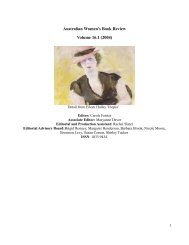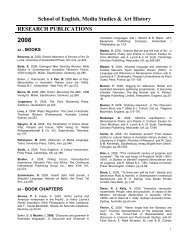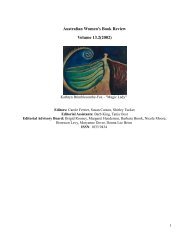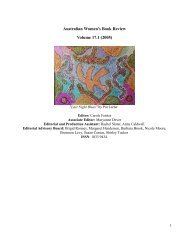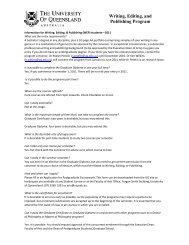Australian Women's Book Review Volume 14.1 - School of English ...
Australian Women's Book Review Volume 14.1 - School of English ...
Australian Women's Book Review Volume 14.1 - School of English ...
Create successful ePaper yourself
Turn your PDF publications into a flip-book with our unique Google optimized e-Paper software.
Adjusting One's Head to Advanced Research<br />
Diana Leonard, A Woman's Guide to Doctoral Studies. Buckingham: Open University Press, 2002.<br />
<strong>Review</strong>ed by Myfanwy McDonald.<br />
I must admit that I didn't read this book 'cover-to-cover in one sitting' as did one person whose<br />
enthusiastic comments are included as a back-cover blurb for Diane Leonard's A Woman's Guide to<br />
Doctoral Studies. This kind <strong>of</strong> enthusiasm may be indicative <strong>of</strong> someone who likes a guide type <strong>of</strong><br />
book (and I wouldn't include myself in that category), it may also be indicative <strong>of</strong> someone who doesn't<br />
have 50 other books to read on the topic <strong>of</strong> their thesis along with having a book like Leonard's to read<br />
about doing the thesis itself. The notion <strong>of</strong> 'A Woman's Guide …' is also a potential put-<strong>of</strong>f for those <strong>of</strong><br />
us who are accustomed to not having our specific experiences covered (lesbian, non-Anglo and so on)<br />
when it comes to a description <strong>of</strong> women's lives. Juggling a family and a career, for example, seems to<br />
be the dominant theme in most discussions regarding women's development in Australia. But too <strong>of</strong>ten<br />
the family being juggled is heterosexual and characterised by a present/absent father and kids, thereby<br />
discounting those <strong>of</strong> us who are caring for older parents, are single, or who have a female partner.<br />
Furthermore in these discussions, a career doesn't usually refer to a Doctorate, which isn't classified as<br />
a career per se, but Doctoral students are still encouraged to view it as a full time job (with a justlivable<br />
wage and without any kind <strong>of</strong> security beyond the 'reasonable completion period' <strong>of</strong> 3.5 years).<br />
It is comforting to note that Leonard's book does not ignore<br />
lesbian, non-Anglo, International and differently-abled<br />
perspectives. I found the book helpful, especially because it<br />
is feminist in a practical sense rather than simply adhering to<br />
a superficial feminist perspective. For example, Leonard<br />
emphasises the importance <strong>of</strong> women Doctoral students<br />
establishing genuine, strong, social networks within<br />
academia because <strong>of</strong> the potential sexism they may face in<br />
an academic environment. This may seem to be rather<br />
obvious advice but I think it is not unusual to assume, for<br />
younger women especially, that once you've passed through<br />
a certain number <strong>of</strong> 'hoops', thereby proving your capability<br />
and commitment, you are relatively immune from<br />
discrimination <strong>of</strong> the sexist type. This is a nice thought but<br />
not very realistic. Academic environments exude their own<br />
brand <strong>of</strong> sexism, and women still have to be aware,<br />
regardless <strong>of</strong> how qualified they may be. It's also easy to<br />
forget that there is a world beyond one's thesis - in the<br />
immediate vicinity, this is other Doctoral students, and<br />
support networks aren't just about looking out for oneself but<br />
looking after the community <strong>of</strong> women within academia.<br />
The book opens with a broad-based view <strong>of</strong> Doctoral studies, namely how Doctoral students fit into the<br />
new 'skills'-based rather than 'expansion <strong>of</strong> the mind'-based academic environment. Leonard<br />
summarises the impact <strong>of</strong> these changes upon Doctoral students in Britain and, on the whole, this<br />
seems relevant to the <strong>Australian</strong> experience. Perhaps the most tangible change is the pressure upon<br />
Doctoral students to complete their thesis within a specific time period, rather than adopting the more<br />
71



